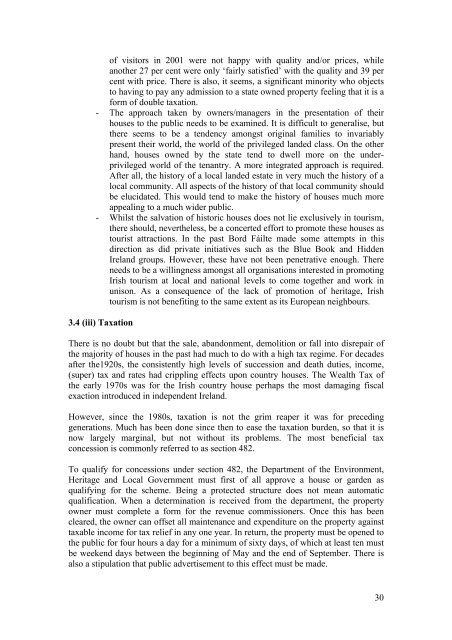A Future for Irish Historic Houses - Irish Heritage Trust
A Future for Irish Historic Houses - Irish Heritage Trust
A Future for Irish Historic Houses - Irish Heritage Trust
Create successful ePaper yourself
Turn your PDF publications into a flip-book with our unique Google optimized e-Paper software.
of visitors in 2001 were not happy with quality and/or prices, while<br />
another 27 per cent were only ‘fairly satisfied’ with the quality and 39 per<br />
cent with price. There is also, it seems, a significant minority who objects<br />
to having to pay any admission to a state owned property feeling that it is a<br />
<strong>for</strong>m of double taxation.<br />
- The approach taken by owners/managers in the presentation of their<br />
houses to the public needs to be examined. It is difficult to generalise, but<br />
there seems to be a tendency amongst original families to invariably<br />
present their world, the world of the privileged landed class. On the other<br />
hand, houses owned by the state tend to dwell more on the underprivileged<br />
world of the tenantry. A more integrated approach is required.<br />
After all, the history of a local landed estate in very much the history of a<br />
local community. All aspects of the history of that local community should<br />
be elucidated. This would tend to make the history of houses much more<br />
appealing to a much wider public.<br />
- Whilst the salvation of historic houses does not lie exclusively in tourism,<br />
there should, nevertheless, be a concerted ef<strong>for</strong>t to promote these houses as<br />
tourist attractions. In the past Bord Fáilte made some attempts in this<br />
direction as did private initiatives such as the Blue Book and Hidden<br />
Ireland groups. However, these have not been penetrative enough. There<br />
needs to be a willingness amongst all organisations interested in promoting<br />
<strong>Irish</strong> tourism at local and national levels to come together and work in<br />
unison. As a consequence of the lack of promotion of heritage, <strong>Irish</strong><br />
tourism is not benefiting to the same extent as its European neighbours.<br />
3.4 (iii) Taxation<br />
There is no doubt but that the sale, abandonment, demolition or fall into disrepair of<br />
the majority of houses in the past had much to do with a high tax regime. For decades<br />
after the1920s, the consistently high levels of succession and death duties, income,<br />
(super) tax and rates had crippling effects upon country houses. The Wealth Tax of<br />
the early 1970s was <strong>for</strong> the <strong>Irish</strong> country house perhaps the most damaging fiscal<br />
exaction introduced in independent Ireland.<br />
However, since the 1980s, taxation is not the grim reaper it was <strong>for</strong> preceding<br />
generations. Much has been done since then to ease the taxation burden, so that it is<br />
now largely marginal, but not without its problems. The most beneficial tax<br />
concession is commonly referred to as section 482.<br />
To qualify <strong>for</strong> concessions under section 482, the Department of the Environment,<br />
<strong>Heritage</strong> and Local Government must first of all approve a house or garden as<br />
qualifying <strong>for</strong> the scheme. Being a protected structure does not mean automatic<br />
qualification. When a determination is received from the department, the property<br />
owner must complete a <strong>for</strong>m <strong>for</strong> the revenue commissioners. Once this has been<br />
cleared, the owner can offset all maintenance and expenditure on the property against<br />
taxable income <strong>for</strong> tax relief in any one year. In return, the property must be opened to<br />
the public <strong>for</strong> four hours a day <strong>for</strong> a minimum of sixty days, of which at least ten must<br />
be weekend days between the beginning of May and the end of September. There is<br />
also a stipulation that public advertisement to this effect must be made.<br />
30


